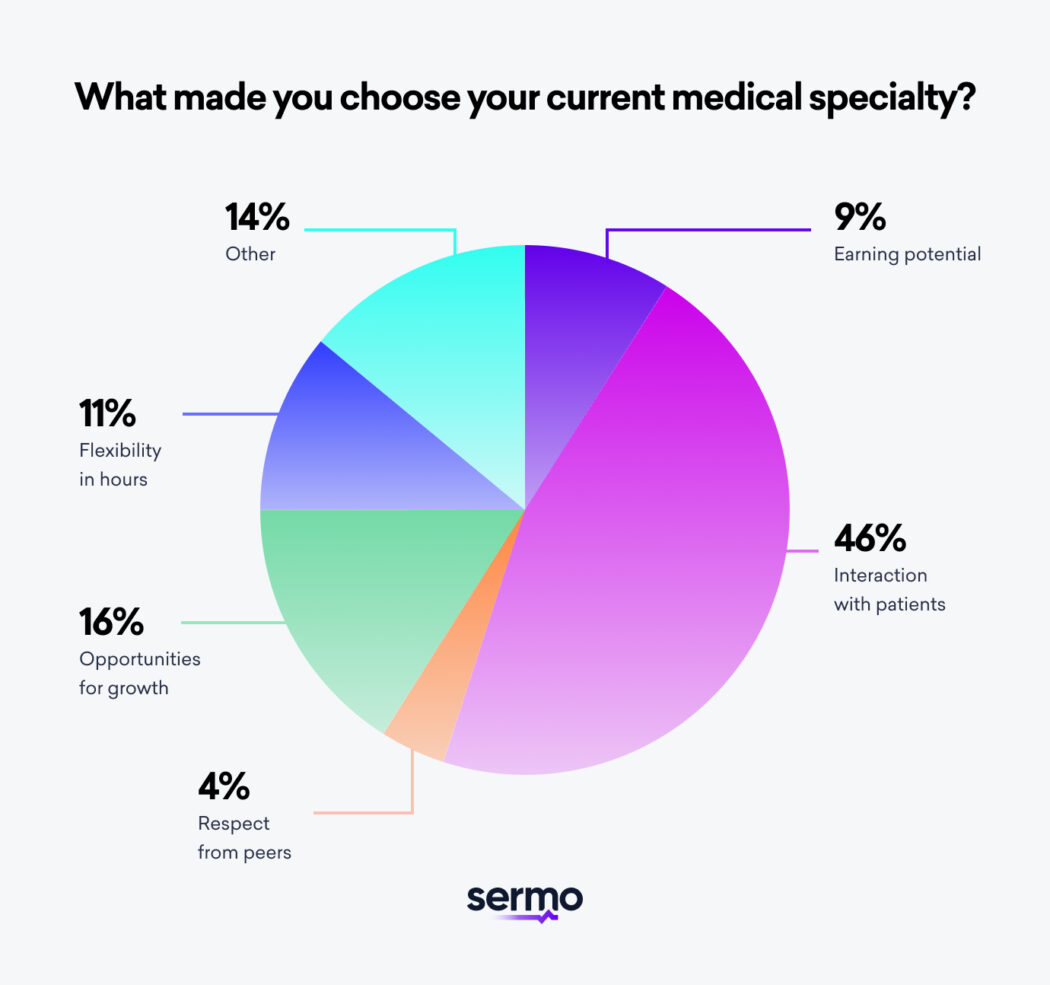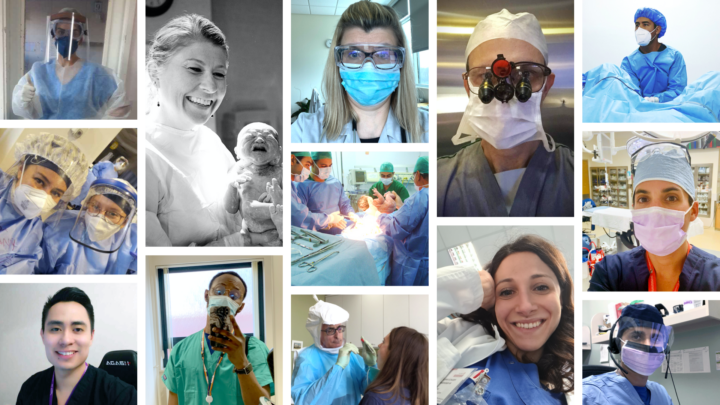
If you’re entertaining the idea of switching doctor specialties, you’re not the only one. In a Sermo survey of 1,500 physicians, 35% reported considering a change.
There are over 135 specialties in the medical field, and there’s one out there that suits your needs. From obstetrics to pulmonology, you can decide which aligns with your preferences and skills.
Making a career change that transforms your life for the better is absolutely possible. Read on as we review some top specialties in medicine based on key career satisfaction metrics for your consideration.

Do physicians change specialties?
Physicians change specialties more than you might think. They’re more likely to change their subspecialty than their specialty, but both types are common. In a 2024 study, CHG Healthcare found that 62% of respondents made a career change in the past two years. This includes both inter- and intra-specialty switches.
Whether you’re considering a new fellowship or specialty altogether, evaluate all factors. Acclimatizing to different routines and jobs takes time, and considering every potential change can help you feel confident you’ve made the right choice.
Start here. Weigh what each specialty offers with your answers to the following seven questions:
How do the educational requirements—duration, training intensity, and cost—of a specialty align with your personal and professional goals?
Do you prefer direct patient care, indirect roles, or a mix? In answering this question, also consider your preferences on patient contact and continuity.
What non-clinical roles—research, advocacy,y or others—do you want to integrate into your career, if any?
What practice setting best suits your preferences?
Which organ system is the most interesting to you?
How do you define your ideal work-life balance?
Which patient populations and clinical outcomes align most with your preferences and temperament?

6 best physician specialties
Below is a list of medical specialties, ranked according to key factors like reported happiness, administrative requirements and work-life balance. Just keep in mind that these details vary based on personal preferences and where you work.
Here are some types of doctors and what they do that make these specialties great options:
- Highest compensation: Neurosurgery
For most physicians, salary isn’t the primary—or even secondary—factor when choosing a medical specialty. A Sermo survey revealed that only 6% of doctors consider salary the most important aspect of their career, while just 9% said earning potential influenced their specialty choice.
If compensation is your priority, surgical specialties generally compensate more than non-surgical specialties. For example, cardiologists earn an average salary of $460,000, and orthopedic surgeons earn $650,000, according to Sermo’s physician compensation report. But you can expect neurosurgery to offer the highest salaries across the board, with an average of around $750,000.
With exceptions, increased compensation corresponds with reduced work-life balance, greater competitiveness, and prolonged education. But, while salary is important, all physicians earn high salaries, regardless of specialty. Consider any factors that influence your personal and professional fulfillment alongside compensation expectations.

Happiest: Plastic Surgery
Across all branches of medicine, Medscape’s 2023 Physician Lifestyle and Happiness Report says that physicians in plastic surgery are the happiest. This is likely because plastic surgeons have more control over their schedules and, in many cases, work with patients who choose to be there.
Beyond this, the self-reported happiest medical specialties are:
- Preventative medicine (69%)
- Orthopedics (65%)
- Otolaryngology (65%)
- Urology (63%)
Medscape’s list of specialties for doctors with the lowest self-reported happiness levels includes:
- Immunology (55%)
- Neurology (54%)
- Oncology (51%)
- Rheumatology (51%)
- Infectious disease (47%)
No single type of doctor shows a clear pattern of higher satisfaction since so many factors impact job satisfaction. These rankings span surgical and non-surgical specialties, patient outcomes, and work-life balance.
And remember, the cause of one physician’s fulfillment in a specialty will differ from the next. Your happiness in a specialty depends less on broad data and more on how well it aligns with your aptitudes, temperament, and lifestyle.

Least administrative tasks: Anesthesiology
High administrative demand is closely linked to decreased career satisfaction and burnout. Physicians report that administrative tasks reduce their overall working capacity and, by extension, their ability to deliver high-quality care—impacting them both professionally and personally.
For example, one ex-general practitioner said on Sermo, “I got fed up with being a GP (paperwork, expenses, running an office, etc.), and I transitioned to do some surgical assisting—best decision of my life!”
On average, Medscape reports that physicians spend 15.5 hours each week on administrative tasks. Anesthesiologists have the least administrative pressure at 9 hours per week. Ophthalmologists come next (10 hours), followed by dermatologists, radiologists, and plastic surgeons (all 11 hours).
- Best work-life balance: ROAD specialties
ROAD specialties—radiology, ophthalmology, anesthesiology, and dermatology—are generally understood to be the most lifestyle-friendly. These specialties typically offer fewer working hours and more predictable shifts than other areas.
Contracts vary significantly. Even in fields of medicine that aren’t typically lifestyle-friendly, individual agreements may include provisions to improve work-life balance, like protected time for administrative or academic tasks, flexible or telehealth options, and reduced on-call duties.

Most flexible: Psychiatry
Sermo surveyed 1,500 physicians and found that 11% chose their specialty primarily for its flexibility.
We traditionally associate flexibility with predictable clinic hours and minimal on-call responsibilities. But today, technology plays an increasingly influential role in how flexible or inflexible a specialty is. Analysts project the telemedicine market will reach $618.34 billion by 2033—an increase from $83.23 billion in 2024.
Although these technological advances affect the entire medical field, they have had the greatest impact on psychiatry. Over 80% of psychiatrists now offer telemedicine, often from work-from-home (WFH) settings, because their field requires more talking than in-person examinations. This makes psychiatry and related specialties some of the most flexible.
- Least patient contact: Pathology
How—and to what extent—you want to interact with patients is a key factor when choosing a specialty. Of the physicians surveyed by Sermo, nearly half (46%) chose a path based on patient interaction and contact.
Contact refers to:
- Direct versus indirect patient care: Some specialties involve behind-the-scenes diagnostic work with little to no direct patient interaction.
- Continuity of care: Long-term care typically requires more patient contact because it relies on physician-patient knowledge and relationships. Instead, certain specialties involve short-term and episodic care, which requires one-time contact (if any).
With these definitions in mind, pathology, anesthesiology, and radiology are a few low-contact options. They typically operate as clinical support specialties with behind-the-scenes diagnostic work with little to no direct patient interaction. As pathology is primarily paraclinical, it typically involves no long-term doctor-patient relationships.
Join a community of 1 million physicians
Finding the best medical specialty for you is possible, but it could require funding hurdles, a salary reduction, or a marked lifestyle change. Before finalizing your decision, research and consider the experiences of physicians across different medical fields of interest. Speaking with physicians in the specialties you’re considering can help you evaluate the field’s alignment with your personal and professional goals. And that’s exactly who you can find on Sermo.
Sermo is the most trusted online community of doctors—a platform where physicians across the globe connect on topics that are important to them and their patients. Gain insights from your peers for more informed decisions. Become a Sermo member today.















